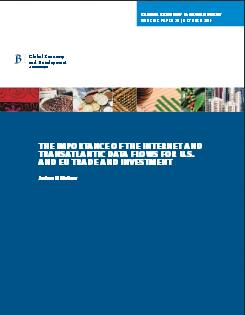Miles, D. (2014) “‘Mensch tracht, und Gott lacht’ – what’s the best guidance on monetary policy?“, VoxEU Organisation, 22 Οκτωβρίου. Many central banks embrace forward guidance by announcing expected interest rate paths. But how likely it is that actual rates will be close to expected ones? This column argues that quantifying such uncertainty poses great difficulties. Precise probability statements in a world of uncertainty (not just risk) can be …Read More
Europe’s Original Sin and the Dangers of Doing Good
CFI (2014) “Europe’s Original Sin and the Dangers of Doing Good“, Capital Finance International (cfi.co), 02 Οκτωβρίου. Carlos Rangel, the Venezuelan diplomat and essayist, once pointedly remarked that western nations often send their failed politicians – the dreamers, utopians, and other ineffectual romantics – to far-off places where they can do no harm other than to their host countries. Mr Rangel (1929-1988) deplored the lack of pragmatism and structure …Read More
The Importance of the Internet and Transatlantic Data Flows for US and EU Trade and Investment
Meltzer, P. J. (2014) “The Importance of the Internet and Transatlantic Data Flows for US and EU Trade and Investment“, Global Economy & Development – Brookings Institute, Working Paper 79, Οκτώβριος 2014. The most globally significant bilateral trade and investment relationship is between the US and the EU An increasing amount of this economic relationship is underpinned by cross-border flows of data. Cross-border data flows between the US and …Read More
Two years after Mario Draghi’s ‘whatever it takes’ moment, the Eurozone is once again staring into the abyss
Hancké, B. (2014) “Two years after Mario Draghi’s ‘whatever it takes’ moment, the Eurozone is once again staring into the abyss“, LSE EUROPP, 21 Οκτωβρίου. Growth in the Eurozone has declined significantly over recent months, raising fears that Europe could be heading toward another economic crisis. Bob Hancké writes on what it would take to generate growth in Eurozone states. He argues that the best – and possibly only …Read More
Regulating Capital Flows at Both Ends: Does it Work?
Ghosh, R. A., Qureshi Saeed, M. & Sugawara, N. (2014) “Regulating Capital Flows at Both Ends: Does it Work?“, IMF Publications, Working Paper 14/188, 17 Οκτωβρίου. This paper examines whether cross-border capital flows can be regulated by imposing capital account restrictions (CARs) in both source and recipient countries, as was originally advocated by John Maynard Keynes and Harry Dexter White. To this end, we use data on bilateral cross-border …Read More
Making regulatory agencies independent is not always a recipe for better decision-making
Jordana, J. & Rosas, G. (2014) “Making regulatory agencies independent is not always a recipe for better decision-making“, LSE EUROPP, 16 Οκτωβρίου. The principle of making certain bodies independent from government, such as regulatory agencies or central banks, has become popular in a number of contexts over recent decades. As Jacint Jordana and Guillermo Rosas write, the basic assumption underpinning the principle is that electoral pressures can have a …Read More
Why We Must Break Up the Financial Herd
Persaud, D. A. (2014) “Why We Must Break Up the Financial Herd“, Peterson Institute for International Economics – Article in QFinance, 16 Οκτωβρίου. Background Memories are short. But those in finance are even shorter. Before the credit crunch began in 2007, policymakers in advanced economies were flirting with the idea that we should just accept that financial crises occur every seven years or so and plan accordingly, as seeking …Read More
Regret and economic decision-making
Strack, P. & Viefers, P. (2014) “Regret and economic decision-making“, VoxEU Organisation, 16 Οκτωβρίου. Regret can shape preferences and thus is an important part of the decision-making process. This column presents new findings on the theoretical and behavioural implications of regret. Anticipated regret can act like a surrogate for risk aversion and could deter investment. However, once people have invested, they become attached to their investment. This commitment is …Read More
Χρονολόγιο: η Εξέλιξη της Οικονομικής Διακυβέρνησης της ΕΕ στο Ιστορικό της Πλαίσιο,
Χρονολόγιο: η Εξέλιξη της Οικονομικής Διακυβέρνησης της ΕΕ στο Ιστορικό της Πλαίσιο, Ευρωπαϊκή Επιτροπή, 16 Οκτωβρίου 2014. Η οικονομική διακυβέρνηση της ΕΕ έχει ενισχυθεί και αναθεωρηθεί με την πάροδο του χρόνου, εξελισσόμενη κι’ αυτή στα πλαίσια των ιστορικών εξελίξεων. Το παρακάτω χρονοδιάγραμμα είναι διαδραστικό (στην πρωτότυπη πηγή του: βλ. εδώ). Πολλά από τα κείμενα περιλαμβάνουν συνδέσμους προς τη σχετική νομοθεσία, καθώς και επιπρόσθετες λεπτομέρειες-πληροφορίες. Εδώ μπορείτε να κατεβάσετε το …Read More
Maximising happiness does not maximise welfare
Glaeser, Ε., Gottlieb, J. & Ziv, O. (2014) “Maximising happiness does not maximise welfare“, VoxEU Organisation, 15 Οκτωβρίου. Governments are now measuring happiness, or subjective wellbeing, and some have begun trying to maximise it. This column discusses recent research showing that happiness is not the same thing as utility. The choices people make suggest that they have desires and objectives other than happiness. It is therefore possible to make …Read More






